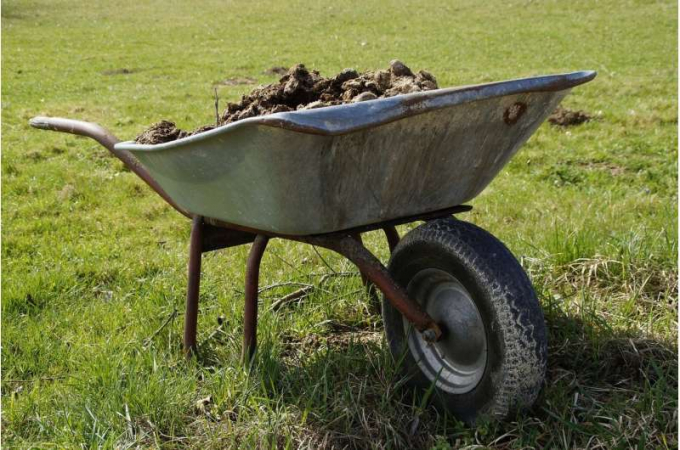November 28, 2025 | 02:53 GMT +7
November 28, 2025 | 02:53 GMT +7
Hotline: 0913.378.918
November 28, 2025 | 02:53 GMT +7
Hotline: 0913.378.918

If pyrolyzed, is equivalent to 11,732 to 42,232 metric tons of nitrogen, valued at $6 million to $21.5 million annually, according to the paper. This can satisfy 23% to 82% of New York State's nitrogen fertilizer needs and substantially reduce environment pollution. Photo: Publish Domain
Judiciously decomposing organic matter from 700 degrees Fahrenheit to 1,200 degrees F, without oxygen—a process known as pyrolysis, very different from incineration- and retaining nutrients from dairy lagoons can transform manure into a manageable, ecologically friendly biochar fertilizer, according to new research published July 22 in Nature Scientific Reports.
That would allow dairy producers to stop storing excreta in on-farm lagoons or spreading it only in nearby fields.
"Manure is usually a liquid problem and it has increasingly been an issue of disposal," said Johannes Lehmann, the Liberty Hyde Bailey Professor in the School of Integrative Plant Science Soil and Crop Sciences Section, in the College of Agriculture and Life Sciences. "Using pyrolysis of solid manure and retention of nutrients from the liquid onto the biochar, we can create a fertilizer from waste. That's a marketable commodity.
"Farmers can spread this fertilizer when the field crops need it, instead of when the farmers need to get rid of manure," he said.
Commercial fertilizer made of nitrogen, phosphorus and potassium is created using carbon inputs like natural gas, sulfur, coal and rock deposits. If agriculture can recycle nitrogen, Lehmann said, farming can reduce the carbon input that comes from fossil fuel.
Doctoral student Leilah Krounbi, the paper's lead author, successfully grew crops with nutrient-enhanced manure biochar. The radish and tomato plants flourished in greenhouse horticultural media with a manure biochar by way of a trick to first treat the biochar with carbon dioxide to enrich it with nitrogen, and saw up to 35% greater plant growth, as well as 36% to 83% greater nitrogen uptake compared with manure biochar alone.
"Once we make a dry fertilizer out of what was once a liquid problem, it is no longer an issue of disposal," said Lehmann, a Cornell Atkinson Center for Sustainability faculty fellow. "It's safe because the solids are pyrolyzed. There are no pathogens, no hormones or antibiotics residues or any other material that could contaminate soil or water."
Nitrogen management is a major challenge throughout the farming world. In New York state, for example, dairy manure waste production averages 12.8 million metric tons annually, which can easily fertilize the state's 43,000 acres of corn. If a farmer grows 200 acres of corn, that producer spends about $28,000 annually for commercial fertilizer, while a dairy farmer with 550 cows spends about $25,000 annually on manure storage, according to the paper.
"Coupling the local excess of manure nutrients with regional fertilizer needs could help farmers save money and alleviate environmental issues," Krounbi said.
Positive economics is another factor. The available dairy waste in New York, if pyrolyzed, is equivalent to 11,732 to 42,232 metric tons of nitrogen, valued at $6 million to $21.5 million annually, according to the paper. This can satisfy 23% to 82% of New York State's nitrogen fertilizer needs and substantially reduce environment pollution.
"You're reducing the volume of the solid waste product that has 90% water and reducing it to zero water," Lehmann said. "If we retain nutrients from the liquid as we have shown in this study, you're going from these huge lagoons that are noticeably emitting odor and climate gasses such as methane and reducing that footprint by an order of magnitude. That's a huge saving all around."
(Phys.org)

(VAN) A new study reveals how the simultaneous effects of ocean acidification, salinity and loss of oxygen are making the world more fragile.

(VAN) Hopes are growing that the creation of the first 3D turkey gut model could be a turning point in the battle against the virulent blackhead disease.

(VAN) Tyson, America’s biggest meat supplier, plans to shutter one of its largest beef processing plants as the industry continues to struggle with low cattle supplies and political pressure from Washington.

(VAN) New FAO study shows how digital solutions are empowering farmers and fishers to prevent losses and build resilient agrifood systems.

(VAN) Brazil's COP30 presidency pushed through a compromise climate deal on Saturday that would boost finance for poor nations coping with global warming but that omitted any mention of the fossil fuels driving it.

(VAN) Poultry farmers in the UK have been warned that they could face one of the worst winters yet for bird flu.

(VAN) Prices of main-crop paddy have risen sharply, with jasmine rice hitting 16,100 baht per tonne — the highest level in years.